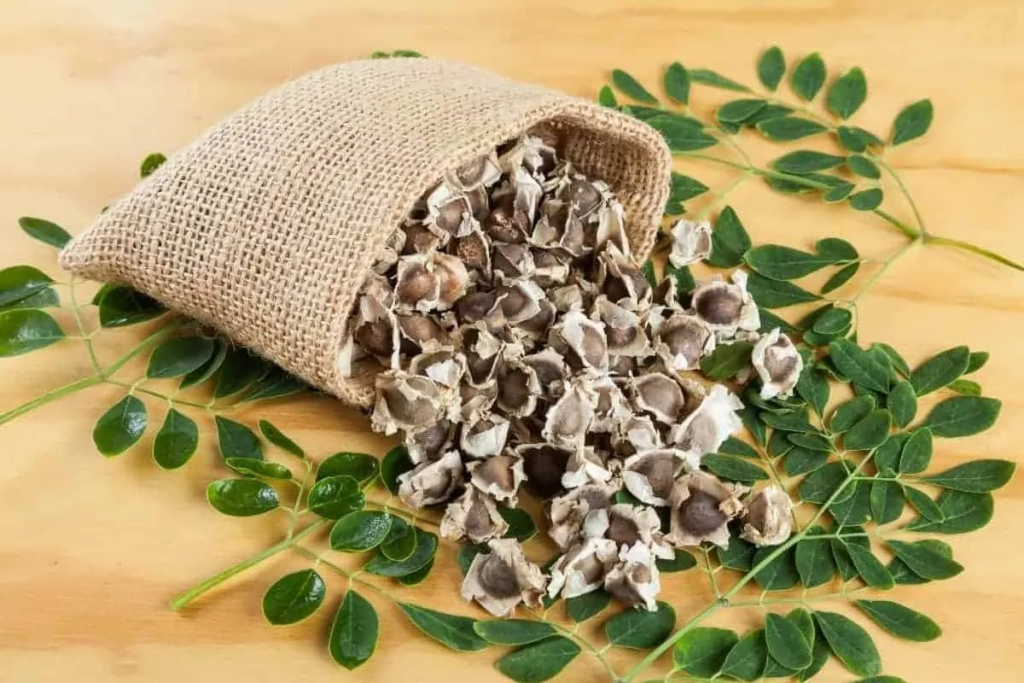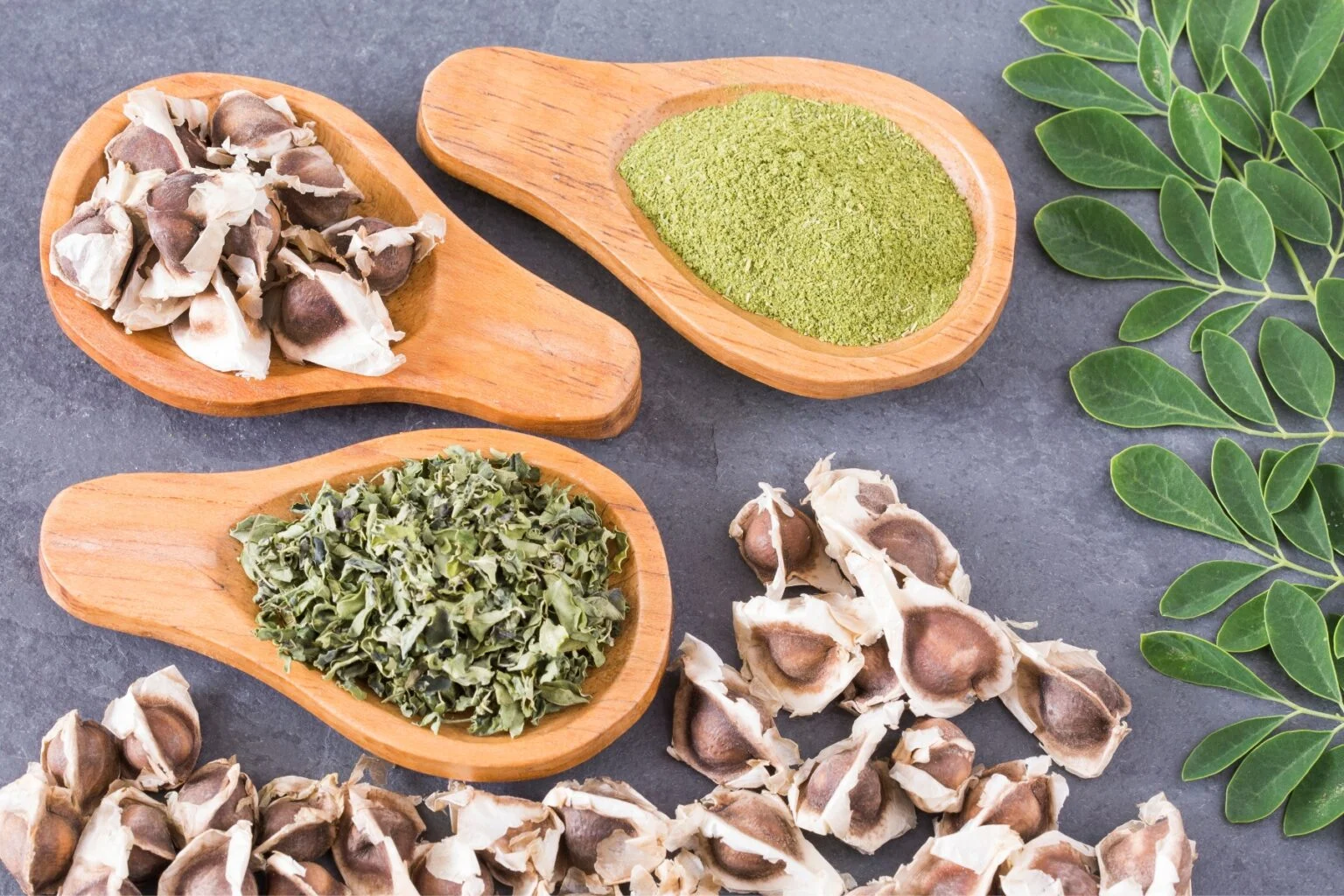Moringa, often referred to as the “Miracle Tree” or “Tree of Life,” has gained global recognition for its exceptional nutritional profile and wide range of health benefits. Native to parts of Africa and Asia, particularly India, Moringa oleifera has been used for centuries in traditional medicine and as a nutritional supplement. Among its most valued parts are the seeds and leaves, both of which are packed with essential nutrients, antioxidants, and bioactive compounds.
Nutritional Profile of Moringa Seeds and Leaves
Moringa Leaves: Moringa leaves are considered a superfood due to their high nutrient density. They are rich in vitamins, particularly vitamins A, C, and E, which act as antioxidants. They also contain significant amounts of calcium, potassium, iron, and magnesium. Additionally, Moringa leaves are a good source of plant-based protein, making them an excellent addition to vegetarian and vegan diets.
Moringa Seeds: Moringa seeds, on the other hand, are known for their high levels of healthy fats, including omega-3 and omega-6 fatty acids. They are also rich in vitamins, particularly vitamin C, and contain a good amount of protein. The seeds have potent antioxidant properties due to the presence of flavonoids and phenolic acids.
Health Benefits of Moringa Seeds and Leaves
- Rich in Antioxidants: Both Moringa leaves and seeds are loaded with antioxidants, which help neutralize free radicals in the body, reducing oxidative stress and lowering the risk of chronic diseases like heart disease, cancer, and diabetes. Antioxidants such as quercetin and chlorogenic acid found in Moringa help protect cells from damage.
- Anti-Inflammatory Properties: Moringa contains isothiocyanates, compounds that have strong anti-inflammatory effects. Chronic inflammation is a key factor in many diseases, and incorporating Moringa into one’s diet can help reduce inflammation and related symptoms.
- Supports Heart Health: The high levels of potassium in Moringa leaves help regulate blood pressure, while the fiber content aids in lowering cholesterol levels. Additionally, the omega-3 fatty acids in Moringa seeds contribute to heart health by reducing triglycerides and supporting overall cardiovascular function.
- Boosts Immunity: Moringa leaves are an excellent source of vitamin C, which is vital for a strong immune system. Regular consumption can help strengthen the body’s defenses against infections and diseases.
- Enhances Skin and Hair Health: The antioxidants and vitamins in Moringa promote healthy skin by reducing the signs of aging and protecting against damage caused by environmental factors. The high protein content supports hair growth and helps maintain healthy hair follicles.
- Improves Digestion: The fiber in Moringa leaves aids in digestion, preventing constipation and promoting a healthy gut. Moringa seeds also have mild laxative properties, making them useful for relieving digestive issues.
- Supports Bone Health: Moringa is rich in calcium and phosphorus, which are essential for maintaining strong bones. Regular intake can help prevent bone loss and improve bone density, especially in older adults.

Culinary Uses of Moringa Seeds and Leaves
Moringa Leaves: Fresh or dried, Moringa leaves can be added to a variety of dishes. They can be used in salads, soups, and stews, or dried and ground into a powder to be added to smoothies, teas, or even sprinkled over meals. The leaves have a slightly bitter taste, similar to spinach or matcha, and can be steamed or sautéed to reduce their bitterness.
Moringa Seeds: The seeds can be eaten raw or roasted, and their oil can be extracted for use in cooking. Moringa seed oil, known as “Ben oil,” is a popular choice for frying due to its high smoke point. The seeds can also be ground into a powder and added to smoothies, soups, or sauces. Additionally, Moringa seeds are used in traditional medicine to treat a variety of ailments.
Innovative Uses of Moringa in Modern Products
Moringa has found its way into many modern products beyond the kitchen. It’s commonly found in skincare products due to its moisturizing and anti-aging properties. Moringa oil is a popular ingredient in creams, lotions, and hair care products. The seeds are also used in water purification, as they have coagulant properties that help remove impurities from water.
How to Incorporate Moringa into Your Daily Diet
- Moringa Tea: Brew dried Moringa leaves into a tea. It can be enjoyed hot or cold and can be sweetened with honey or lemon for added flavor.
- Smoothies: Add a teaspoon of Moringa powder to your morning smoothie for an extra nutritional boost.
- Cooking: Incorporate Moringa leaves into soups, stews, and stir-fries, much like you would with spinach or kale.
- Snacking: Moringa seeds can be roasted and seasoned for a healthy snack alternative.
Conclusion
Moringa seeds and leaves are nutrient-dense, versatile, and beneficial to health in numerous ways. Whether consumed fresh, dried, powdered, or as an oil, Moringa is a powerful addition to any diet. As more people discover its benefits, Moringa continues to grow in popularity, proving itself as a true “Miracle Tree” for nutrition and wellness.
Ajigofarms is a reliable global agricultural purchase sourcing with profound expertise in the manufacturing, and exportation of food crops. We are tested, and trusted suppliers of all kinds of cash crops and food crops. Our constant supply chain solution makes exporting easy, quick, and safe, we are identified with timeliness and meeting up with deadlines. Regardless of the region you are located in worldwide, you can reliably order your Agric products and be rest assured of successful delivery.




